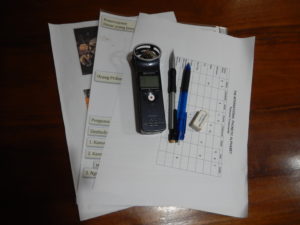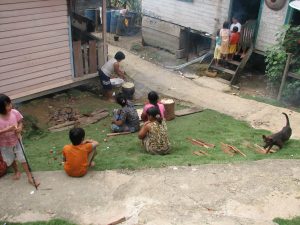Random observations from 12 years (so far) of learning, speaking, and coaching in 3 languages and bumping up against others:
Languages are hard.
They just are. Of course there are harder ones and somewhat less hard ones and insanely difficult ones, all relative to the language(s) you already speak and how similar or different the one you’re trying to learn is to the one(s) you already know. But they’re all hard. Think about everything you can communicate with your native language—thoughts, feelings, opinions, satire, hypothetical situations, deep spiritual truths, complicated strings of events, cause and effect, detailed instructions, technical knowledge in your field of expertise, etc., etc. Now think about getting to the place where you can communicate all of that in another language, naturally, accurately, and effectively. Yeah.

Languages take time.
You might run into one language-learning program or another that promises to teach you another language in a matter of months. And some of those programs might even succeed in teaching you lots of words and phrases—plenty to get you through a trip where you need to say things like “My name is Bob” or “Where’s the bathroom?” or “I’m hungry.” But think again about everything you can say in your native language. To get to real fluency, to that kind of fluency, takes a minimum of 2 years of full time study even in the “easiest” languages.
Languages are beautifully complex.
Again, think of your native language. Think about all the nuances. The way it can make you laugh or bring a tear to your eye. Chances are you’ve taken it all for granted up to this point. But languages are covered in God’s fingerprints. The Creator designed human beings to communicate. That’s a big part of what it means to be made in His image. And because languages are spoken by people who are created in God’s image, I would venture to say that every single one of them is fully adequate (and beyond adequate) for every kind of communication. Even creole languages, if they are spoken as anyone’s native language, will quickly develop into rich, full-blown, complex systems capable of expressing anything that needs to be expressed. God just made their speakers that way. If there’s something that can’t yet be expressed, it’s probably just because it hasn’t been important in that culture up to that point.
Alright, this seems like a good place for an example. Say you learn a language spoken by a group of semi-nomadic people for whom the ability to move quickly has always been very important (and even crucial to their survival at times.) They don’t have a word for patience (though the concept can be explained using other words.) They do a lot of hard, physical work to survive. Their language has close to 20 different words for the one action of “cutting” something, depending on how the action is done, the shape of what is being cut, etc. Most of these words are not interchangeable or generic, as I may or may not have learned from experience by the confused looks on faces when I tried it. A lot of other action words in the language are this way too—way more diversified and specific than English action words. So which language is richer in vocabulary? English, or this one? Which is more or less precise? Both. And neither. It all depends on what you’re talking about. And that’s just one example, in the area of vocabulary (there’s way more than that to a language—but that’s a subject for another blog post.)
All that to say, languages are incredible. They’ve taught me so much about God’s creativity, and I know I’ve barely scraped the surface. Whatever language (or dialect of a language) you have the privilege of speaking or studying, know that it is beautiful and accurate and complete. It doesn’t matter whether it is spoken by “educated” people or illiterate ones, jungle-dwellers or metropolitans, there is nothing “simple” or “backward” about it. It’s a creative masterpiece, and deserves to be treated as such.
Leave a Reply
You must be logged in to post a comment.